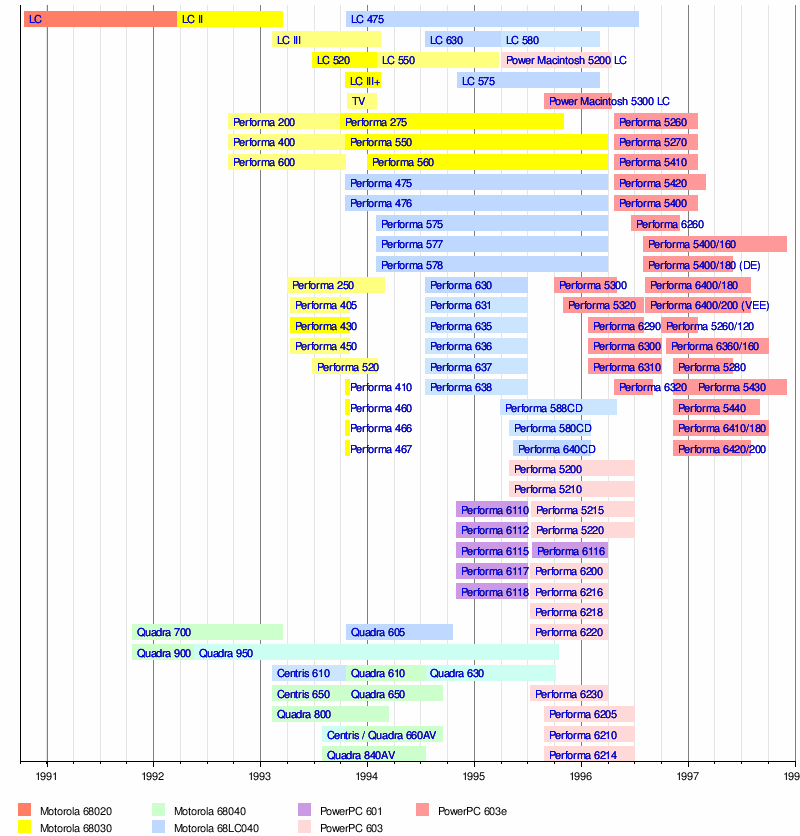Macintosh Quadra 650
 | |
| Developer | Apple Computer |
|---|---|
| Product family | Centris, Quadra |
| Release date | February 10, 1993 |
| Introductory price | US$2,699 (equivalent to $5,693 in 2023) |
| Discontinued | September 12, 1994 |
| Operating system | System 7.1 to OS 8.1 or with PowerPC Upgrade OS 9.1, A/UX |
| CPU | Motorola 68LC040 or 68040 @ 25 or 33 MHz |
| Memory | 4 or 8 MB onboard, expandable to 132 or 136 MB (80 ns 72-pin SIMM) |
| Dimensions | Height: 6 inches (15 cm) Width: 13 inches (33 cm) Depth: 16.5 inches (42 cm) |
| Weight | 25 pounds (11 kg) |
| Predecessor | Macintosh IIci Macintosh Quadra 700 |
| Successor | Power Macintosh 7100 Power Macintosh 8100 |
| Related | Macintosh Quadra 610 |
The Macintosh Quadra 650, originally sold as the Macintosh Centris 650, is a personal computer designed, manufactured and sold by Apple Computer from February 1993 to September 1994. The Centris 650 was introduced alongside the smaller Centris 610 as the replacement for the Macintosh IIci and Quadra 700, and it was intended as the start of the new midrange Centris line of computers.[1] Later in 1993, Apple decided to follow an emerging industry trend of naming product families for their target customers – Quadra for business, LC for education, and Performa for home – and folded the Centris 650 into the Quadra family.[2]
The Quadra 650 was discontinued without a direct replacement in September 1994, although the recently introduced Power Macintosh 7100, which has the same IIvx form factor as the 650, had a similar target audience and was sold in the same price range.
Models

There are two versions of the Centris 650: One with 4 MB of RAM soldered to the logic board and an FPU-less Motorola 68LC040 CPU, and one with 8 MB of logic board RAM, a full Motorola 68040, and an onboard AAUI port for Ethernet. Each can be configured with an 80 MB, 230 MB, or 500 MB 3.5-inch hard drive. Standard equipment on all Centris 650 models includes onboard video (with VGA support via an adapter), 3 NuBus slots, a Processor Direct Slot, two ADB and two serial ports, an external SCSI connector, and a 5.25-inch drive bay. There are four SIMM slots that support 4, 8, 16, and 32 MB SIMMs, allowing for a maximum of 132 or 136 MB of RAM depending on the amount of soldered memory. System 7.1 was included as standard and is the minimum required version.[3]
The higher-end model also came with 1MB VRAM installed, enabling 16-bit color at 640x480 resolution.[3] The availability of 16-bit color was significant, as it was the standard bit depth of Apple's then-new QuickTime video standard.[citation needed]
As a way to promote the use of multimedia, Apple also sold a Centris 650 "CD-ROM bundle", which had 8 MB of RAM and 1 MB of video RAM, and included a microphone, an AppleCD 300i CD-ROM drive, and a System 7 install CD.[3]
Introduced February 10, 1993:
- Macintosh Centris 650:[4] Sold in five configurations:[1]
- 25 MHz 68LC040, 4 MB RAM (on board), 512 KB VRAM, 80 MB HDD, no Ethernet
- 25 MHz 68040, 8 MB RAM (on board), 512 KB VRAM, 80 MB HDD, Ethernet
- 25 MHz 68040, 8 MB RAM (on board), 512 KB VRAM, 230 MB HDD, Ethernet
- 25 MHz 68040, 8 MB RAM (on board), 1 MB VRAM, 230 MB HDD, Ethernet, AppleCD 300i and microphone
- 25 MHz 68040, 24 MB RAM (including 8 MB on board), 1 MB VRAM, 500 MB HDD, Ethernet
Introduced October 21, 1993:
- Macintosh Quadra 650:[5] 33 MHz 68040.
Timeline
| Timeline of Macintosh Centris, LC, Performa, and Quadra models, colored by CPU type |
|---|
 |
References
- ^ a b Gruman, Galen (April 1993). "Centris 610 & 650 - Two new midrange performers replace the venerable Mac II line". Macworld. Vol. 10, no. 4. pp. 106–113.
- ^ Sieter, Charles (December 1993). "New 040 Macs - We sort out the complex new lineup". Macworld. Vol. 10, no. 12. pp. 92–98.
- ^ a b c Pogue, David; Schorr, Joseph (1999). "Chapter 12: From 128K to Quadra: Mac to Mac". MacWorld Mac Secrets, 5th Edition. IDG Books. pp. 481-482. ISBN 0-7645-4040-8.
- ^ "Centris 650: Technical Specifications". Apple.
- ^ "Macintosh Quadra 650: Technical Specifications". Apple.
External links
- Centris 650 and Quadra 650 at apple-history.com
- Centris 650 and Quadra 650 at Low End Mac
- Centris 650 and Quadra 650 at EveryMac.com